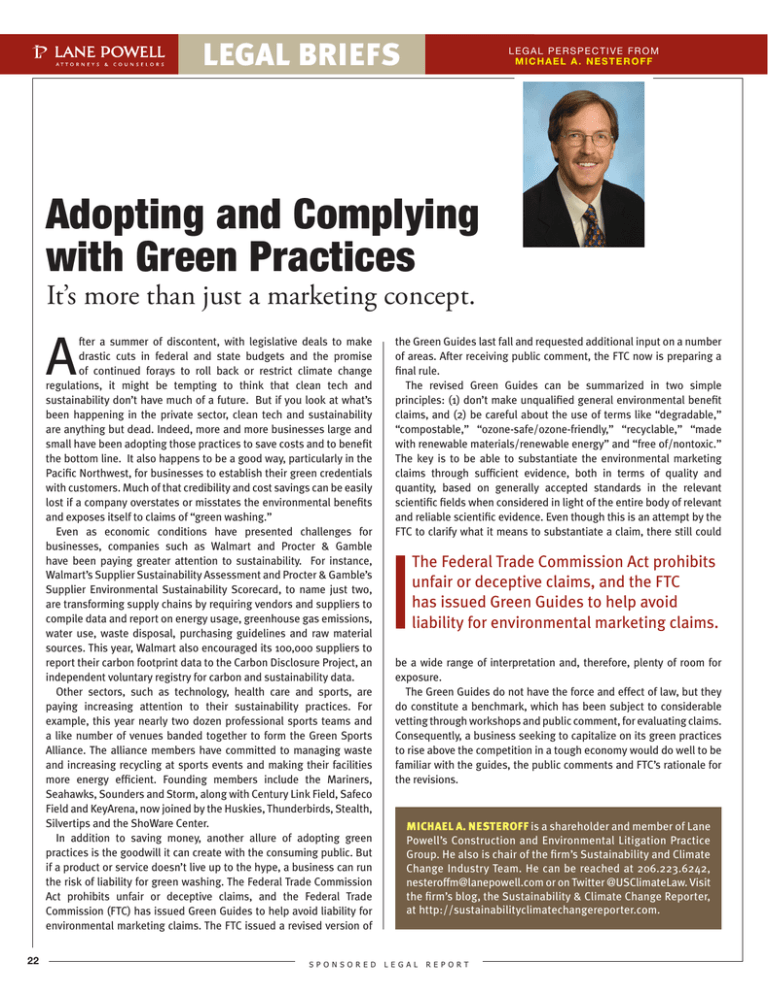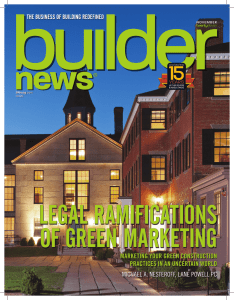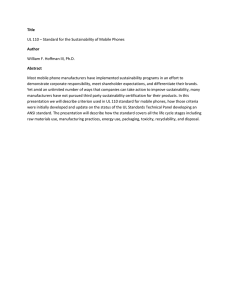A
advertisement

legal briefs legal perspective from michael a. nesteroff Adopting and Complying with Green Practices It’s more than just a marketing concept. A fter a summer of discontent, with legislative deals to make drastic cuts in federal and state budgets and the promise of continued forays to roll back or restrict climate change regulations, it might be tempting to think that clean tech and sustainability don’t have much of a future. But if you look at what’s been happening in the private sector, clean tech and sustainability are anything but dead. Indeed, more and more businesses large and small have been adopting those practices to save costs and to benefit the bottom line. It also happens to be a good way, particularly in the Pacific Northwest, for businesses to establish their green credentials with customers. Much of that credibility and cost savings can be easily lost if a company overstates or misstates the environmental benefits and exposes itself to claims of “green washing.” Even as economic conditions have presented challenges for businesses, companies such as Walmart and Procter & Gamble have been paying greater attention to sustainability. For instance, Walmart’s Supplier Sustainability Assessment and Procter & Gamble’s Supplier Environmental Sustainability Scorecard, to name just two, are transforming supply chains by requiring vendors and suppliers to compile data and report on energy usage, greenhouse gas emissions, water use, waste disposal, purchasing guidelines and raw material sources. This year, Walmart also encouraged its 100,000 suppliers to report their carbon footprint data to the Carbon Disclosure Project, an independent voluntary registry for carbon and sustainability data. Other sectors, such as technology, health care and sports, are paying increasing attention to their sustainability practices. For example, this year nearly two dozen professional sports teams and a like number of venues banded together to form the Green Sports Alliance. The alliance members have committed to managing waste and increasing recycling at sports events and making their facilities more energy efficient. Founding members include the Mariners, Seahawks, Sounders and Storm, along with Century Link Field, Safeco Field and KeyArena, now joined by the Huskies, Thunderbirds, Stealth, Silvertips and the ShoWare Center. In addition to saving money, another allure of adopting green practices is the goodwill it can create with the consuming public. But if a product or service doesn’t live up to the hype, a business can run the risk of liability for green washing. The Federal Trade Commission Act prohibits unfair or deceptive claims, and the Federal Trade Commission (FTC) has issued Green Guides to help avoid liability for environmental marketing claims. The FTC issued a revised version of 22 Sponsored the Green Guides last fall and requested additional input on a number of areas. After receiving public comment, the FTC now is preparing a final rule. The revised Green Guides can be summarized in two simple principles: (1) don’t make unqualified general environmental benefit claims, and (2) be careful about the use of terms like “degradable,” “compostable,” “ozone-safe/ozone-friendly,” “recyclable,” “made with renewable materials/renewable energy” and “free of/nontoxic.” The key is to be able to substantiate the environmental marketing claims through sufficient evidence, both in terms of quality and quantity, based on generally accepted standards in the relevant scientific fields when considered in light of the entire body of relevant and reliable scientific evidence. Even though this is an attempt by the FTC to clarify what it means to substantiate a claim, there still could The Federal Trade Commission Act prohibits unfair or deceptive claims, and the FTC has issued Green Guides to help avoid liability for environmental marketing claims. be a wide range of interpretation and, therefore, plenty of room for exposure. The Green Guides do not have the force and effect of law, but they do constitute a benchmark, which has been subject to considerable vetting through workshops and public comment, for evaluating claims. Consequently, a business seeking to capitalize on its green practices to rise above the competition in a tough economy would do well to be familiar with the guides, the public comments and FTC’s rationale for the revisions. michael a. nesteroff is a shareholder and member of Lane Powell’s Construction and Environmental Litigation Practice Group. He also is chair of the firm’s Sustainability and Climate Change Industry Team. He can be reached at 206.223.6242, nesteroffm@lanepowell.com or on Twitter @USClimateLaw. Visit the firm’s blog, the Sustainability & Climate Change Reporter, at http://sustainabilityclimatechangereporter.com. Legal Report






